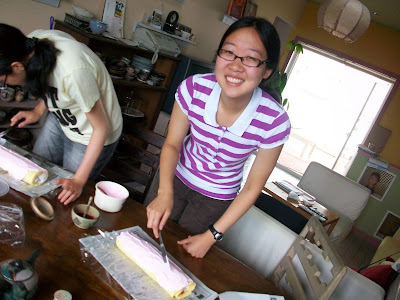One of my goals this summer was to be able to speak Japanese in a natural speed without having to think too long about what I wanted to say. Of course, I still lack the vocab for a lot of situations, but I’m amazed at how much a homestay will improve your speaking – language pledges are great and everything, but after being around actual Japanese people for almost a month, I can sometimes pass for a functioning, comprehensible human – (SOMETIMES – other times, I still sound like a three-year-old). I’m even daring to use the causative/passive tongue-twisters, “I was rained on,” “I was made by so-and-so to do this,” etc. So about a week ago, I decided to practice more タメ語, or tamego, the casual style used for friends and family members. HIF warned us not to use タメ語 with our host parents, but I still get tons of practice with Riko and other HIFers. So much, in fact, that I’m starting to carelessly use it with the 先生. Uh-oh. Sometimes, I catch myself just in time to add 〜んですけど…, which is more commonly used when you’re commenting on a mutually known assumption, but for me, it’s a cheat way to make something polite in about .3 seconds.
This pic actually makes me look like I'm successfully making a roll cake! (although this was not the case at many points in the process...)
Nowadays, I sometimes let タメ語 slip to my host parents too, but for some reason, they still use the neutral style to me, especially Okaa-san. I really wish they would just use タメ語 so I could practice listening too. (Whenever Riko starts one of her rants about school or another, I usually crash and burn.) Riko says it’s because I use the neutral style in class, but of course, we covered タメ語 in first-year Japanese at Yale – we just never USE it. The director from Wheaton College had definitely caught onto something about working in a coffee shop. Maybe I can mention something to Okaa-san about it, but once again, I’m wary of sounding too direct. Oh, the unbearable Japanese politeness.
My talented Okaa-san
Made completely by hand!
Then again, I remember mentioning in my Light application how much I appreciated the different levels of the Japanese language. It's a challenge switching back and forth between friends and strangers, especially when they're in the same room, but I think it gives the language a sense of sophistication. Same for Korean too, although I'm starting to appreciate Korean all the more for not having to figure out who's in-group and who's out-group...
Didn't realize how much of an international crowd we had - China, France, Bulgaria...
We also had a lecture this week from a professor who taught Japanese in Germany. It was pretty dry, but one of the questions in the question-and-answer session was whether 敬語 "keigo", the super-polite form of Japanese, would ever cease to exist. As long as the Japanese found it useful for showing respect in job interviews and welcoming customers in stores, he replied, it was here to stay. Although outside of that, it seems that the younger generations are using it less and less. Riko says I probably don't need 敬語 unless I want to work for a Japanese company in the future. Also, the female and male forms are slowly blending in together -- once, I used ~わ to one of my Japanese friends at Yale, and she burst out in laughter. Guess they'll update the textbooks sometime or later...
Lucky Pierrot's infamous whale burger - tasted like a cross between pork and chicken, only extremely deep-deep-fried. Hakodate's quirky fast food joint only sell 20 a day because of the concern about whale hunting in Japan, and afterwards, Pankova-san made me feel extremely remorseful for my deed.
share on: facebook






1 comments:
THAT ROLLCAKE. AMAZING.
Post a Comment